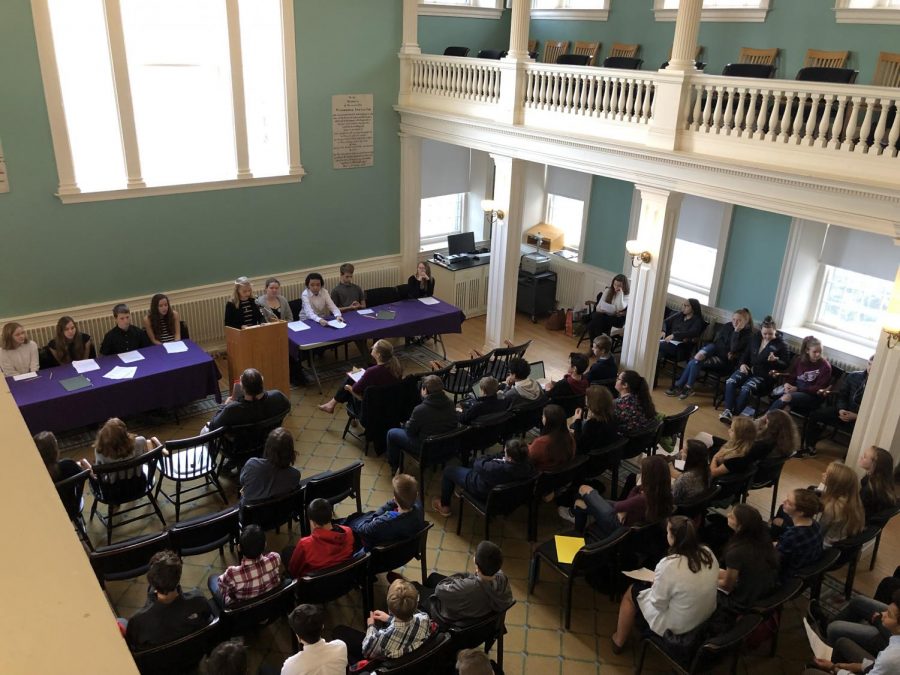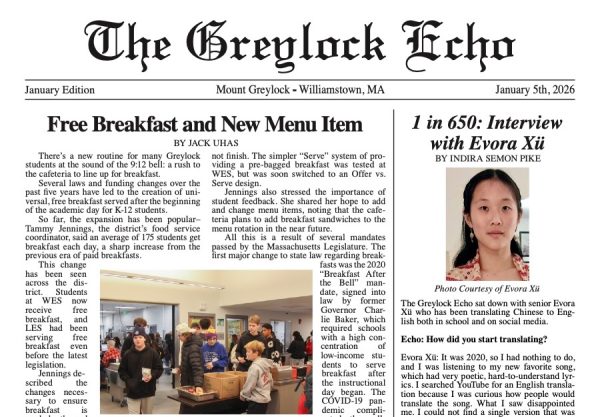Eighth Grade Debates Return to Griffin Hall
Photo courtesy of Maddy Art
Two teams of eighth graders present speeches at Griffin Hall.
Right before break, this year’s eighth graders continued the Mount Greylock tradition of debating constitutional issues. The two days full of debates were the culmination of almost a month of in-depth research and preparation that occurred in the students’ English and Social Studies classes under the leadership of Social Studies teacher Mr. Blackman and English teacher Ms. Sulzmann.
In late November, each student completed a form indicating their preference for debate topics. Then, just before Thanksgiving break, the students were assigned their topic and the group with whom they would be closely working for the next month. This year, the topics to be debated included the Electoral College, the Assault Weapons Ban, Domestic Spying, the Pledge of Allegiance, the Death Penalty, Zero Tolerance Policies, the Equal Rights Amendment, and Flag Burning. Remarkably, every student was given the topic that they indicated as their top choice. As Ms. Sulzmann explained, this ensured that everyone was interested in their topic and is partially responsible for the “high level of engagement” that she observed. For the first two weeks of research, students did not know which side of the issue they would be debating, meaning that they became familiar with their topic from all angles. They were then sorted into five-person teams within their ten-person groups; each team was assigned to a side of the debate by a coin flip. The eighth graders then worked as a team to organize their research into coherent arguments and rebuttals, forming one coalesced debate between the ten people. After polishing their speeches, the eighth grade went to Griffin Hall on Williams College campus on December 18 and 19 for the debates themselves to occur.
This is the third year that the debates have occurred at Williams due to the renovation of the auditorium, meaning that Mr. Blackman is now familiar enough with the venue to know “how to work things and where the trouble points are,” he said. Also new in recent years is the fact that more of the project has been completed online, as students each have their own Chromebooks. This allows students the ability to work on their arguments at home without having to worry about losing physical papers. With minor changes like these over the nearly twenty years that eighth graders have done some form of debates, the assignment has been fine-tuned to a format that develops students’ leadership, teamwork, public speaking, and analytical skills.
Given Ms. Dupee’s recent retirement, it was the first year of debates for new English teacher Ms. Sulzmann. She said that she found the project to be a “really authentic way to address a lot of the Common Core standards,” including writing an objective summary and argument writing. She also cited the benefits of the public speaking portion of the project, noting that she was “very impressed that every single one of them was able to get up there” to give their speech.
After their time at Griffin Hall, the Echo was able to sit down with eighth graders Molly Sullivan and Emma Gilooly to talk about their experience with the debates. Sullivan debated for the constitutionality of domestic spying, while Gilooly argued that there should be an amendment to ban flag burning. Each said that they chose those topics because they did not have much background knowledge and wanted to learn more. They also each felt like they were on the side of the debate that was harder to argue. Although she felt that having to argue that domestic spying is constitutional was more difficult, ultimately, Sullivan said, “I think it was really good because my team just kept going and we persevered and, in the end, I felt like we balanced the other team, even though in the beginning we only had three arguments and we were supposed to have six.” In addition to working through the setback of finding adequate arguments, the sheer amount of work that the project took was a challenge. Sullivan explained that, while there were times when the workload was lighter, “there were times when it required every single piece of your effort. Some days I would have three periods straight where I would just be working on it and I would just be so done by the end.” Gilooly agreed that working so intently on one thing was a new experience, explaining that “[the debates] were the only thing we focused on in school, so it took a lot of stress from everyone.”
When asked about the lessons that they’ll take away from the project, Sullivan and Gilooly mentioned the same skills that their teachers stressed: public speaking and teamwork. Getting up to speak in front of the entire grade to give a speech is no small feat, but many high schoolers cite that experience as foundational in their current public speaking abilities. Gilooly echoed this, saying that she’s now “less scared of public speaking.” Sullivan added that she’s gotten better at working in a group, particularly because “we all wanted to do well.”







